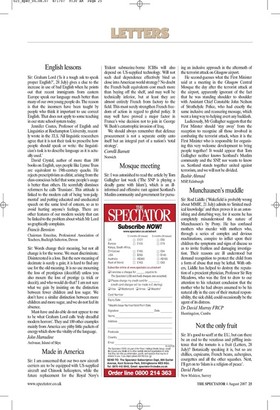English lessons
Sir: Graham Lord (Is it a tough ask to speak proper English?', 28 July) gives a clue to the increase in use of bad English when he points out that recent immigrants from eastern Europe speak our language much better than many of our own young people do. The reason is that the incomers have been taught by people who think it important to use correct English. That does not apply to some teaching in our state school system today.
Jennifer Coates, Professor of English and Linguistics at Roehampton University, recently wrote in the TLS, All linguistic researchers agree that it is not their task to prescribe how people should speak or write: the ling-uistician's task is to describe language as it is actually used.'
David Crystal, author of more than 100 books on English, says people like Lynne Truss are equivalent to 19th-century quacks. He rejects prescriptivism as elitist, arising from the class-conscious belief that some people's usage is better than others. He scornfully dismisses reformers he calls `Trussians'. This attitude is linked to the modern cult of being 'non-judgmental' and putting educated and uneducated speech on the same level of esteem, so as to avoid hurting anyone's feelings. There are other features of our modern society that can be linked to the problem about which Mr Lord so graphically complains.
Francis Bennion Chairman Emeritus, Professional Association of Teachers, Budleigh Salterton, Devon Sir: Words change their meaning, but not all change is for the worse. We must discriminate. Disinterested is a loss. But the new meaning of decimate is surely a gain; it is hard to find any use for the old meaning. It is no use mourning the loss of prestigious (deceitful) unless you also mourn the loss of prestige (a trick or deceit); and who would do that? I am not sure what we gain by insisting on the distinction between fewer children and less sugar. We don't have a similar distinction between more children and more sugar, and we do not feel its absence.
Must-have and do-able do not appear to me to be what Graham Lord calls 'truly dreadful modern honors'. They and 100 other examples mainly from America are pithy little packets of energy which show the vitality of the language.
John Han-adine Ardvasar, Island of Skye








































 Previous page
Previous page